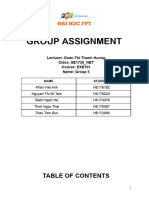0 ratings0% found this document useful (0 votes)
6 viewsCurriculum Path for AI, Robotics, and Software Development with Python
The document outlines a comprehensive curriculum path for learning AI, Robotics, and Software Development using Python, divided into five phases. Each phase focuses on foundational skills, intermediate development, AI and machine learning, robotics, and practical experience, with recommended resources and practice activities. The final phase emphasizes real-world application through capstone projects and continuous learning in the field.
Uploaded by
ebiereokunolaCopyright
© © All Rights Reserved
Available Formats
Download as PDF, TXT or read online on Scribd
0 ratings0% found this document useful (0 votes)
6 viewsCurriculum Path for AI, Robotics, and Software Development with Python
The document outlines a comprehensive curriculum path for learning AI, Robotics, and Software Development using Python, divided into five phases. Each phase focuses on foundational skills, intermediate development, AI and machine learning, robotics, and practical experience, with recommended resources and practice activities. The final phase emphasizes real-world application through capstone projects and continuous learning in the field.
Uploaded by
ebiereokunolaCopyright
© © All Rights Reserved
Available Formats
Download as PDF, TXT or read online on Scribd
You are on page 1/ 3
Curriculum Path for AI, Robotics, and
Software Development with Python
Phase 1: Foundational Skills (3-4 months)
1. Python Basics (1 month)
Topics: Syntax, data types, control structures, functions, modules, file I/O.
RESOURCES:
"Automate the Boring Stuff with Python" by Al Sweigart Codecademy's Python course
PRACTICE: SOLVE BASIC PROBLEMS ON PLATFORMS LIKE HACKERRANK OR LEETCODE.
2. Data Structures and Algorithms (1-2 months)
Topics: Lists, dictionaries, sets, tuples, stacks, queues, trees, graphs, sorting and
searching algorithms.
RESOURCES:
"Python Data Structures and Algorithms" by Benjamin Baka "Grokking Algorithms" by
Aditya Bhargava
PRACTICE: LEETCODE, HACKERRANK, AND CODESIGNAL CHALLENGES.
3. Version Control with Git (2 weeks)
Topics: Basic Git commands, branching, merging, GitHub.
RESOURCES:
"Pro Git" by Scott Chacon and Ben Straub GitHub Learning Lab
PRACTICE: MANAGE A SMALL PROJECT USING GITHUB.
Phase 2: Intermediate Python and Software Development (3-
4 months)
1. Object-Oriented Programming (OOP) (1 month)
Topics: Classes, objects, inheritance, polymorphism, encapsulation.
RESOURCES:
"Python Crash Course" by Eric Matthes Real Python tutorials on OOP
PRACTICE: BUILD A SMALL OOP-BASED PROJECT, LIKE A TEXT-BASED GAME.
2. Web Development Basics (1 month)
Topics: HTML, CSS, JavaScript, Flask/Django basics.
RESOURCES:
"Flask Web Development" by Miguel Grinberg Django Girls tutorial
PRACTICE: CREATE A SIMPLE WEB APPLICATION.
3. Databases and SQL (1 month)
Topics: SQL basics, database design, using SQLite/MySQL with Python.
RESOURCES:
"SQL for Data Analysis" by Cathy Tanimura SQLZoo tutorials
PRACTICE: DEVELOP A SMALL APPLICATION WITH A DATABASE BACKEND.
Phase 3: Introduction to AI and Machine Learning (4-5
months)
1. Mathematics for AI (1 month)
Topics: Linear algebra, calculus, probability, and statistics.
RESOURCES:
Khan Academy courses on linear algebra and calculus "Introduction to Probability" by
Joseph K. Blitzstein
PRACTICE: SOLVE MATH PROBLEMS RELATED TO AI AND ML.
2. Machine Learning Fundamentals (2 months)
Topics: Supervised and unsupervised learning, regression, classification, clustering.
RESOURCES:
"Hands-On Machine Learning with Scikit-Learn, Keras, and TensorFlow" by Aurélien Géron
Coursera's "Machine Learning" by Andrew Ng
PRACTICE: WORK ON KAGGLE COMPETITIONS AND PROJECTS.
3. Deep Learning Basics (1 month)
Topics: Neural networks, deep learning frameworks (TensorFlow, PyTorch).
RESOURCES:
"Deep Learning with Python" by François Chollet Fast.ai course
PRACTICE: IMPLEMENT BASIC NEURAL NETWORKS AND EXPERIMENT WITH SIMPLE DATASETS.
4. Natural Language Processing (NLP) (1 month)
Topics: Text preprocessing, sentiment analysis, language modeling.
RESOURCES:
"Natural Language Processing with Python" by Steven Bird, Ewan Klein, and Edward Loper
Coursera's NLP Specialization
PRACTICE: BUILD AN NLP PROJECT LIKE A CHATBOT OR SENTIMENT ANALYZER.
Phase 4: Robotics and Advanced Topics (4-5 months)
1. Introduction to Robotics (1 month)
Topics: Robotics fundamentals, kinematics, sensors, actuators.
RESOURCES:
"Introduction to Robotics: Mechanics and Control" by John J. Craig Coursera's "Modern
Robotics" Specialization by Northwestern University
PRACTICE: SIMULATE A ROBOT USING SOFTWARE LIKE V-REP OR GAZEBO.
2. Robot Operating System (ROS) (1-2 months)
Topics: ROS basics, robot simulation, creating and managing nodes.
RESOURCES:
"Programming Robots with ROS" by Morgan Quigley, Brian Gerkey, and William D. Smart
ROS tutorials from the official ROS Wiki
PRACTICE: DEVELOP A SIMPLE ROBOTIC APPLICATION USING ROS.
3. Computer Vision (1 month)
Topics: Image processing, object detection, OpenCV.
RESOURCES:
"Learning OpenCV" by Gary Bradski and Adrian Kaehler Coursera's "Computer Vision" by
the University of Michigan
PRACTICE: BUILD A PROJECT INVOLVING IMAGE RECOGNITION.
4. Advanced AI Topics (1-2 months)
Topics: Reinforcement learning, generative models, advanced neural network
architectures.
RESOURCES:
"Deep Reinforcement Learning Hands-On" by Maxim Lapan Coursera's "Advanced Machine
Learning Specialization" by National Research University Higher School of Economics
PRACTICE: IMPLEMENT ADVANCED MODELS AND PARTICIPATE IN RELATED COMPETITIONS.
Phase 5: Practical Experience and Projects (6+ months)
1. Capstone Projects (6+ months)
ACTIVITIES:
Develop and deploy a full-scale AI application. Build and program a functional robot.
Collaborate on open-source projects. Participate in hackathons and competitions.
OBJECTIVE: APPLY ALL THE SKILLS LEARNED TO REAL-WORLD PROBLEMS, ENHANCE YOUR PORTFOLIO, AND GAIN
PRACTICAL EXPERIENCE.
CONTINUOUS LEARNING AND IMPROVEMENT
STAY UPDATED: FOLLOW AI AND ROBOTICS RESEARCH, READ RELEVANT PAPERS, AND STAY CURRENT WITH
INDUSTRY TRENDS.
NETWORK: JOIN AI AND ROBOTICS COMMUNITIES, ATTEND CONFERENCES, AND CONNECT WITH PROFESSIONALS IN
THE FIELD.
ADVANCED COURSES: CONSIDER PURSUING ADVANCED DEGREES OR SPECIALIZED CERTIFICATIONS IF NEEDED.
You might also like
- 6-Month Roadmap To Becoming An AI Engineer - A Step-by-Step GuideNo ratings yet6-Month Roadmap To Becoming An AI Engineer - A Step-by-Step Guide21 pages
- 6-Month Roadmap to Becoming an AI Engineer_ a Step-By-Step GuideNo ratings yet6-Month Roadmap to Becoming an AI Engineer_ a Step-By-Step Guide20 pages
- My Self-Created Artificial Intelligence Masters Degree100% (1)My Self-Created Artificial Intelligence Masters Degree10 pages
- Personal AI Learning Path - Ammar MohannaNo ratings yetPersonal AI Learning Path - Ammar Mohanna8 pages
- AIML_Domestic_Executive_Brochure_Dec_10_2024No ratings yetAIML_Domestic_Executive_Brochure_Dec_10_202425 pages
- Introduction to Learning Artificial Intelligence (AI) a Step-By-Step GuideNo ratings yetIntroduction to Learning Artificial Intelligence (AI) a Step-By-Step Guide6 pages
- Curricullum Advanced Generative AI Certification Course (2)No ratings yetCurricullum Advanced Generative AI Certification Course (2)6 pages
- Math for Deep Learning: What You Need to Know to Understand Neural NetworksFrom EverandMath for Deep Learning: What You Need to Know to Understand Neural NetworksNo ratings yet
- Data Science Fusion: Integrating Maths, Python, and Machine LearningFrom EverandData Science Fusion: Integrating Maths, Python, and Machine LearningNo ratings yet
- Batch_result_for_JSS 2_JSS2C_Template first termNo ratings yetBatch_result_for_JSS 2_JSS2C_Template first term4 pages
- Batch_result_for_SSS 1_SS1B_Template 2nd termNo ratings yetBatch_result_for_SSS 1_SS1B_Template 2nd term1 page
- Weekly Report for 27th of December to 4th of JanuaryNo ratings yetWeekly Report for 27th of December to 4th of January3 pages
- 080824_DE Rantau Pass FAQ_ChinaBangladesh_MAFNo ratings yet080824_DE Rantau Pass FAQ_ChinaBangladesh_MAF9 pages
- (M19CAD1107) I M. Tech I Semester (R19) Regular ExaminationsNo ratings yet(M19CAD1107) I M. Tech I Semester (R19) Regular Examinations2 pages
- Statement of Purpose: (Distributed and Cognitive Robotics)No ratings yetStatement of Purpose: (Distributed and Cognitive Robotics)2 pages
- Bioinspired Hierarchical Electronic Architecture For Robotic Locomotion Assistance Application in ExoskeletonsNo ratings yetBioinspired Hierarchical Electronic Architecture For Robotic Locomotion Assistance Application in Exoskeletons13 pages
- B.E. PROJECT 2016-17: Mounting and Installation of Product by Robotic Arm in CNC MachinesNo ratings yetB.E. PROJECT 2016-17: Mounting and Installation of Product by Robotic Arm in CNC Machines12 pages
- Latest Robotics Projects Ideas For Engineering StudentsNo ratings yetLatest Robotics Projects Ideas For Engineering Students7 pages
- Advanced 6-Dof Mobile Manipulator For Assembly TasksNo ratings yetAdvanced 6-Dof Mobile Manipulator For Assembly Tasks6 pages
- Động lực học và điều khiển robot: Robot manipulator and controlNo ratings yetĐộng lực học và điều khiển robot: Robot manipulator and control34 pages
- 2-Self-Tuning Fuzzy PID Control of A Four-Mecanum Wheel Omni-Directional Mobile PlatformNo ratings yet2-Self-Tuning Fuzzy PID Control of A Four-Mecanum Wheel Omni-Directional Mobile Platform6 pages
- Mechatronics and Robotics New Trends and Challenges 1st edition by Roberto Indri, Marina Oboe ISBN 0367562049 9780367562045 - Read the ebook now with the complete version and no limits100% (4)Mechatronics and Robotics New Trends and Challenges 1st edition by Roberto Indri, Marina Oboe ISBN 0367562049 9780367562045 - Read the ebook now with the complete version and no limits77 pages
- VOICE CONTROLLED ROBOTIC HAND (Mini Project Report)100% (1)VOICE CONTROLLED ROBOTIC HAND (Mini Project Report)21 pages
- Robotics and Automations Material - M - Vinoth KumarNo ratings yetRobotics and Automations Material - M - Vinoth Kumar63 pages
- Robotics Applications in Natural HazardsNo ratings yetRobotics Applications in Natural Hazards7 pages
- IEEE Xplore - The Evolution of Robotics ResearchNo ratings yetIEEE Xplore - The Evolution of Robotics Research1 page
- PRACTICAL_ROBOTICS_HANDS_ON_TOOL_IN_TEACHING_FWILTGEN_2022No ratings yetPRACTICAL_ROBOTICS_HANDS_ON_TOOL_IN_TEACHING_FWILTGEN_202217 pages
- ChatPDF-Chapter 5 - Robot Technology of The FutureNo ratings yetChatPDF-Chapter 5 - Robot Technology of The Future3 pages
- Stroke Rehabilitation Using Exoskeleton-Based Robotic Exercisers: Mini ReviewNo ratings yetStroke Rehabilitation Using Exoskeleton-Based Robotic Exercisers: Mini Review6 pages































































































